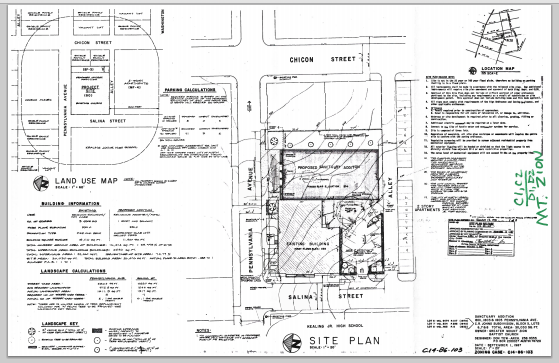Commission reverses Mt. Zion church decision
Thursday, July 30, 2015 by
Jack Craver Confronted with new information about zoning regulations related to the Greater Mt. Zion Baptist Church at 1801 Pennsylvania Ave., the Planning Commission voted Tuesday night to reverse a decision it had made in June aimed at helping the church sell the property.
Commissioners also voted on 7-3 on Tuesday to recommend denial of Greater Mount Zion’s request for termination of the restrictive covenant. Chair Stephen Oliver and Commissioners Tom Nuckols and James Schissler voted in opposition.
For now, the commission has postponed further action on the church until Sept. 8, when it will discuss proposals to lift two key restrictions attached to the land – a restrictive covenant and a zoning site plan – that prevent it from being used for anything but a house of worship.
While both the covenant and the zoning site plan were put in place nearly 30 about 20 years ago, the Planning Commission was aware of only the former when it voted in June to terminate the covenant after church leaders argued that that specific regulation was preventing them from selling the property, which is valued at roughly $3.4 million.
Shortly after that vote, however, city staff informed the commission that it had made a mistake in assessing how the property could be used. While the commission had taken the vote under the assumption that the parcel’s General Office zoning restricted it to only civic uses, it turned out that the GO zoning would allow the land to be used for a wide range of business activities.
The missing information was trumpeted by neighbors opposed to the church’s plan as proof that the commission needed to rescind its decision to terminate the covenant.
“Termination of the restrictive covenant would have been considered far less appropriate” if the commission had had the right information, said Clifton Van Dyke, president of the Kealing Neighborhood Association. Another neighbor opposed to the plan, Maegan Ellis, said killing the covenant could lead to a property use that is far too intense for the neighborhood, such as a 24-hour medical center.
But in an attempt to bat away those concerns, staff dropped the bomb about the additional restriction – the zoning site plan. Removing the covenant, explained Planning and Development Department Manager Jerry Rusthoven, is only one step in the process of allowing other uses on the property.
Some commissioners were incredulous that such key information hadn’t been a part of the initial (or follow-up) discussion of the case.
“That the zoning site plan wasn’t brought up in the original discussion kind of bothers me,” said Chair Stephen Oliver.
Addressing Henry Gilmore, an attorney for Mt. Zion, Commissioner Patricia Seeger asked why the church was so adamant about getting rid of the covenant but not addressing the additional restrictions on the parcel.
Gilmore, a former longtime planning commissioner, reasoned that an attempt to rezone the property was an action more appropriately left to the eventual buyer, who could ask that the land be rezoned to accommodate its intended use. But getting the covenant out of the way, he argued, would be a crucial part of the church attracting potential buyers.
That argument made some commissioners uneasy.
“I feel like if we assist in marketing this property that in a way isn’t clear about how it can be used, we are going to have somebody in front of us who was not part of this agreement saying, ‘I paid $3.4 million for a piece of property that I thought I could do more with,’” said Commissioner Nuria Zaragoza, who voted in June against lifting the covenant as a member of the previous commission.
After digesting the new information, commissioners voted 9-1 to rescind the previous commission’s action to terminate the covenant. Commissioner James Schissler was the lone no vote. While some commissioners appeared to base their votes on the concerns voiced by neighbors, others reasoned that any decision to grant the church’s request should be made in the context of the new information presented by staff.
Thus, immediately following that vote, the commission jumped into discussion on whether to reinstate the recommendation of the previous commission to kill the covenant. On this question, Oliver and Commissioner Tom Nuckols joined Schissler in voting to approve the recommendation.
Citing the existence of the zoning site plan, Nuckols reasoned that terminating the covenant would be a good compromise that would ease one of the burdens the church faces in selling the property while allowing neighbors the assurance that the property could not easily be used for anything.
“I think having the belt and suspenders is a hardship on the church,” he said, a line of reasoning that Oliver later echoed in an interview with the Austin Monitor.
The commission decided to postpone further discussion of the issue until the proposal to terminate the covenant could be paired with a proposal to rezone the property entirely.
This story has been corrected.
You're a community leader
And we’re honored you look to us for serious, in-depth news. You know a strong community needs local and dedicated watchdog reporting. We’re here for you and that won’t change. Now will you take the powerful next step and support our nonprofit news organization?




